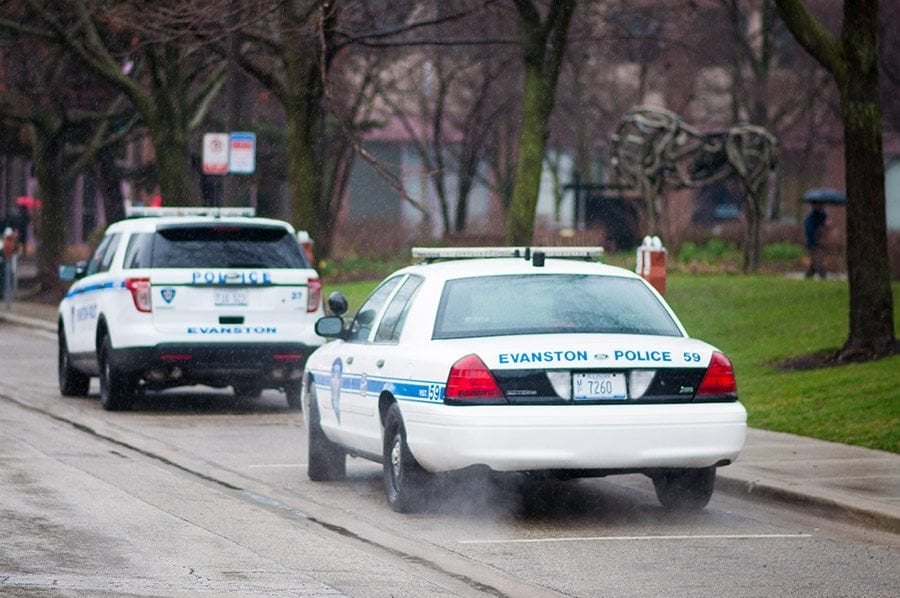Police Chief Schenita Stewart discusses community concerns, policing mental health crises
Daily file photo by Daniel Tan
Evanston Police Department vehicles. Police Chief Schenita Stewart spoke Wednesday about her approach to policing.
January 18, 2023
Evanston Police Chief Schenita Stewart spoke at a virtual community meeting Wednesday, presented by the League of Women Voters and the NAACP.
Stewart addressed questions from moderator and LWV member Helen Gagel about her time in office, allegations of racism in the Evanston Police Department, community policing and police approaches to mental health crises. The two also focused on Stewart’s ties to the Evanston community.
“She has deep roots in Evanston. She’s a graduate of Evanston Township High School,” Gagel said about Stewart. “She comes to us from 23 years in law enforcement.”
Stewart became EPD’s first woman and first Black woman police chief in October. The last permanent police chief, Demitrous Cook, left in June 2021 after being sued for posting EPD suspects’ mugshots on Snapchat. Two interim police chiefs, Aretha Barnes and Richard Eddington, served for less than a year each before Stewart’s appointment.
Now, Stewart said she’s trying to build deeper collaborations with institutions throughout the city, including the Parks and Recreation Department, Evanston/Skokie School District 65, Evanston Township High School District 202, Northwestern, local hospitals and the Evanston Public Library.
“Unfortunately, the police department’s had a long history of not wanting to collaborate with people outside the walls of the PD,” she said. “For this to work, we all need to work jointly together.”
Stewart also acknowledged allegations of racism within the police department, as well as in interactions between EPD and the broader community.
She felt “very disappointed” about a report from Black city employees describing workplace discrimination, Stewart said, and is now trying to listen to staff and create a safer environment. In November, Black employees of Evanston released a 39-page document detailing inequities they faced working for various city departments, including EPD.
“What I won’t allow is anybody that works for me or with me to be treated any type of way. That won’t be tolerated,” she said. “And if that’s the way people want to act, they don’t need to work for the Evanston Police Department.”
Stewart said as a child, she experienced a negative encounter with EPD, which informs her understanding of racism in the police force.
To improve relationships with Evanston residents, Stewart said she’s prioritizing EPD’s community policing model, where officers make efforts to have positive encounters with city residents.
Michael Nabors, the president of the NAACP Evanston branch and senior pastor of Second Baptist Church, said in the Zoom chat that he appreciated Stewart’s commitment to this approach.
“It is all about partnership with every sector in the community,” he agreed.
Attendees also asked Stewart about her efforts to support those experiencing houselessness, mental health crises or substance abuse issues.
EPD officers work with Chicago organization Trilogy Behavioral Healthcare by calling their mobile emergency response team when in situations relating to mental health crises, Stewart said.
She suggested residents call the police if they see an unhoused person sleeping in the doorway of a business. However, she did not mention how so-called “nuisance crimes,” like sleeping in a doorway, can “criminalize the very state of being homeless,” according to the Illinois Criminal Justice Information Authority.
However, EPD is still looking for more ways to approach mental-health related calls, Stewart said.
“Those suggestions come from staff or come from the public when you’re open to them,” she said. “We got to continue to be open to those conversations.”
Email: [email protected]
Twitter: @avivabechky
Related Stories:
— Schenita Stewart sworn in as Evanston’s next police chief
— First-response Alternative Crisis Team provides mental health support to people in crisis


